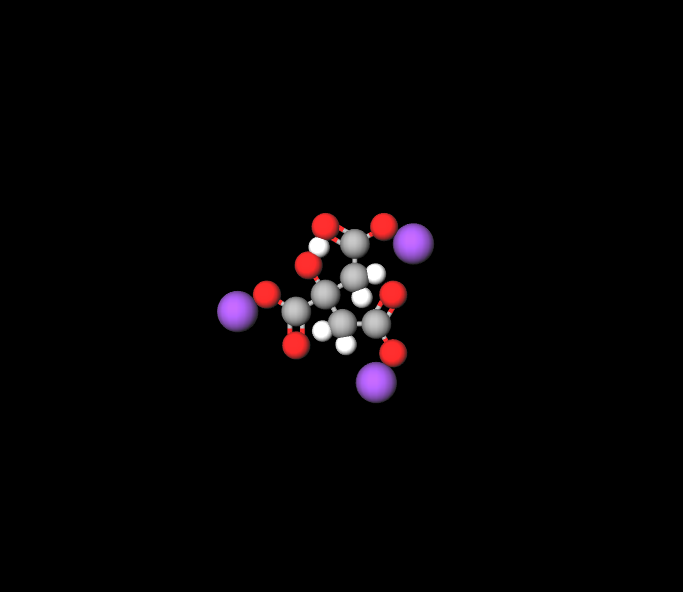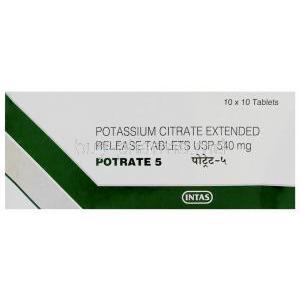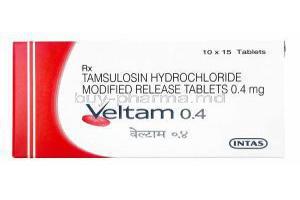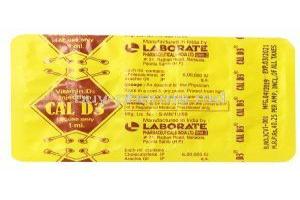Potassium Citrate
- I. Introduction to Potassium Citrate
- II. Composition and Properties of Potassium Citrate
- III. Uses of Potassium Citrate
- IV. Off-label Uses of Potassium Citrate
- V. How Potassium Citrate Works
- VI. Dosage and Administration of Potassium Citrate
- VII. Side Effects of Potassium Citrate
- VIII. Interactions with Other Medications
- IX. Warnings and Contraindications
- X. Precautions and Monitoring
- XI. Special Considerations for Different Populations
- XII. Management of Overdosage
- XIII. Storage and Handling Precautions
I. Introduction to Potassium Citrate
Definition and Overview
Potassium citrate is a compound commonly used in medicine to effectively treat and prevent specific types of kidney stones. It works by making the urine less acidic, which helps decrease the formation of salts that lead to stone formation.
Historical Background and Development
Potassium Citrate has seen an evolution in its medicinal applications since it was first introduced. Initially extracted from citric acid, this substance has been utilized for purposes since the beginning of the 20th century, becoming known for its effectiveness in decreasing the recurrence of renal stones.
II. Composition and Properties of Potassium Citrate
Chemical Structure and Formula
The chemical structure of Potassium Citrate, known as C6H5K3O7, consists of a potassium salt derived from citric acid. This arrangement is crucial for its effects.

Physical and Chemical Properties
Potassium Citrate, a scentless crystalline powder, easily dissolves in water, aiding its quick absorption and effective therapeutic impact on the urinary system.
III. Uses of Potassium Citrate
Primary Indications for Potassium Citrate
-
Hypocitraturic Calcium Oxalate Nephrolithiasis:
- Potassium citrate is used to prevent the formation of calcium oxalate kidney stones in patients with mild to moderate hypocitraturia (urinary citrate levels >150 mg/day). The initial dose is 15 mEq twice daily or 10 mEq three times daily, with a maximum daily dose of 100 mEq1.
-
Uric Acid Lithiasis with or without Calcium Stones:
- Potassium citrate is also indicated for the management of uric acid lithiasis. The dosing regimen is similar to that for hypocitraturic calcium oxalate nephrolithiasis1.
-
Role in Treating Renal Tubular Acidosis (RTA):
- Potassium citrate plays a crucial role in treating RTA, a condition characterized by an accumulation of acid in the body due to renal dysfunction. By increasing urinary pH and citrate levels, it helps correct the acid-base imbalance2.
IV. Off-label Uses of Potassium Citrate
Application in Urinary Alkalization
Potential Benefits in Gout Management
Exploring Uses in Other Conditions
Recent studies indicate that Potassium Citrate may have benefits in preventing stones and supporting specific metabolic conditions.
V. How Potassium Citrate Works
Mechanism of Action in the Body
Potassium Citrates' effectiveness lies in their capacity to regulate pH levels in the body and urine, which helps decrease the likelihood of developing stones.
Effects on Urinary pH and Stone Formation
By raising the pH levels in urine, Potassium Citrate aids in dissolving acid, an important element in averting the formation of crystal-like stones, in the kidneys.

Potassium Citrate for kidney stones
Potassium citrate is employed in treating a kidney stone condition known as tubular acidosis. It is also utilized to prevent kidney stones that might arise in individuals, with gout. Potassium citrate serves as an alkalinizer.
Impact on Acid-Base Balance
The medication also helps address metabolic acidosis, assisting in keeping an acid-base environment in the body.
VI. Dosage and Administration of Potassium Citrate
Recommended Dosages for Different Conditions
The amount needed depends on the illness being addressed, between 15 and 60 milliequivalents, per day split into multiple doses for better absorption and to reduce stomach discomfort.
Dosage Adjustments and Considerations
Changes are frequently needed depending on kidney function, blood electrolyte levels, and monitoring of urine acidity, highlighting the importance of customized treatment.
Administration Techniques and Tips
For results and to minimize stomach discomfort, it's recommended to take Potassium Citrate with food or a glass of water. This helps dilute the urine and boosts the levels of citrate effectively.
Potassium Gluconate vs Potassium Citrate
Potassium citrate consists of potassium and citric acid whereas potassium gluconate is made up of potassium and gluconic acid. Both potassium citrate and potassium gluconate can serve as food additives or supplements each, with its unique uses.
Potassium Citrate in food
Potassium citrate has a taste and is commonly used in food for flavoring. It can be spotted in items such as lemon-lime soda, lemonade, and sour candies. Potassium citrate is often found in beverages containing sweeteners, as its tartness helps offset the bitterness of various sugar substitutes.
VII. Side Effects of Potassium Citrate
Common Side Effects and Management
- Gastrointestinal issues like feeling queasy throwing up, and having diarrhea
- On occasions, it may lead to high levels of potassium in the blood, especially in individuals with kidney problems.
Serious Adverse Effects and Risk Factors
Although harmless, severe outcomes such as gastrointestinal bleeding or major metabolic imbalances necessitate prompt medical attention.
Long-term Side Effect Considerations
Regularly monitoring kidney function, serum electrolyte levels, and overall health is essential for long-term use to prevent any negative impacts and guarantee continued safety and effectiveness.
VIII. Interactions with Other Medications
Common and Significant Drug Interactions
Potassium Citrate has the potential to interact with medications, which could change how they work. Specifically, it can impact the absorption and effectiveness of drugs like digoxin and certain blood pressure medications. Moreover, using it at the same time as other potassium-sparing diuretics may increase the risks of high potassium levels in the body.
Interaction with Dietary Supplements
Combining Potassium Citrate with potassium-containing supplements may raise the risk of hyperkalemia. It's important for individuals to seek advice, from healthcare professionals before starting any supplement.
Effects of Alcohol and Lifestyle Factors
Lifestyle decisions, such as how much alcohol you consume, can impact how well Potassium Citrate works. Drinking alcohol could worsen its ability to make you urinate more, causing dehydration and affecting the drug's ability to prevent kidney stones.
IX. Warnings and Contraindications
Major Contraindications for Use
People who have levels of potassium in their blood serious kidney problems or take medications that retain potassium should steer clear of Potassium Citrate. Its also not recommended for individuals, with Addisons disease because it could raise the risk of having much potassium in the body.

Warnings for Special Populations
- Patients who have heart issues should be careful when using Potassium Citrate because it could lead to heartbeats due to high potassium levels.
- People, with ulcer disease might find that their symptoms worsen.
Risks Associated with Overconsumption
Consuming too much Potassium Citrate may cause metabolic imbalances, like alkalosis and hyperkalemia, which could result in severe heart and muscle issues.
X. Precautions and Monitoring
Monitoring Kidney Function and Blood Levels
It is crucial to check kidney function and serum potassium levels to avoid the risk of kidney damage or the serious condition of high potassium levels, which could be life-threatening.
Importance of Regular Physician Consultation
Regular communication with a healthcare professional is key to overseeing medication doses and making timely modifications according to the patient's reactions and test findings.
Adjustments for Special Conditions
Patients with levels of kidney function or those undergoing notable changes, in their fluid and electrolyte levels may need to have their medication doses modified.
XI. Special Considerations for Different Populations
Administration to Elderly Patients
As people get older, they might need Potassium Citrate because their bodies can be more sensitive to its effects as their kidney function changes with age.
Use in Pregnant Women and Nursing Mothers
During pregnancy and breastfeeding it is generally considered safe to use Potassium Citrate with the guidance of a doctor. However, it is advisable to use it when absolutely necessary, taking into account both the possible advantages and risks involved.
Guidelines for Administration to Children
When it comes to children receiving treatment, it is crucial to carefully consider the safety and efficacy of Potassium Citrate. The dosage should be finely tuned based on their requirements and kidney function.
XII. Management of Overdosage
Signs and Symptoms of Overdosage
Excessive consumption of Potassium Citrate may result in muscle weakness, disorientation, irregular heartbeats, and, in instances, breathing difficulties.
Immediate Steps and Antidotes
It's important to seek help right away if someone has taken too much medication. Treatment might include giving calcium gluconate to counteract any harm to the heart and taking steps to lower potassium levels in the blood.
Preventive Measures and Education
Patients need to be informed about the symptoms of overdose and the significance of following their medication doses diligently.
XIII. Storage and Handling Precautions
Proper Storage Conditions
Make sure to keep Potassium Citrate at room temperature and shield it from moisture and sunlight to preserve its chemical stability.
Safety Tips for Handling and Disposal
Be cautious when dealing with this medication to prevent contact, with the skin and eyes and make sure to dispose of it to avoid any potential harm to people or the surroundings.
Stability and Shelf Life
Potassium Citrate is typically very stable, lasting a time if stored properly, which supports its effectiveness for therapy.






















